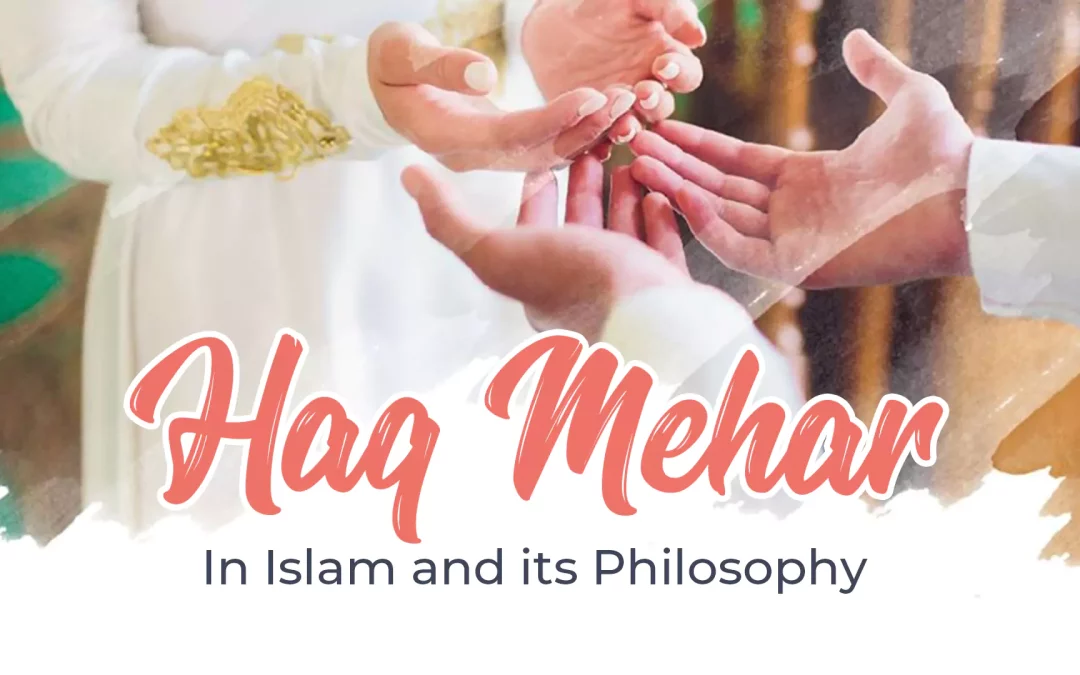Islamic wedding traditions and customs are very special and focus mainly on two events: the Nikkah (marriage ceremony) and the Walima. Just like sweets and desserts are important at weddings, there is an important part of the Nikkah called Haq Mehar in Islam. Haq Mehar is a gift that the groom gives to the bride. It is not just a custom but a sacred rule and an important part of the Nikkah.
Haq Mehar is very important in Islam, but sadly, many people don’t give it the attention it deserves in our society. Haq Mehar is not just about money — it’s a way for a husband to show respect, love, and fairness to his wife. It’s more than just a financial matter, which is why there is no fixed sharai haq mehar amount. It’s like a promise from the groom to take care of and honor his wife.
This idea fits perfectly with Islamic teachings about working together and understanding each other in marriage. The philosophy behind sharai haq mehar shows the balance Islam wants between husband and wife rights, valuing not only material things but also feelings and respect.
Even though it’s a vital financial responsibility in marriage, many people aren’t aware of its significance, and girls rarely ask for it. Today, our topic is the Haq Mehar in Islam and its underlying philosophy. Stick around until the end to discover why it matters and the wisdom that it holds.
What is Haq Mehar in Islam?
Islam gives many rights to both men and women, especially when they begin a loving relationship. One very important right of a wife is Haq Mehar. The husband gives Haq Mehar to his wife after the Nikkah (marriage).
Haq Mehar is like a wedding gift from the husband to his wife. Islam teaches that the groom shouldn’t feel pressured when deciding the haq mehr amount in Islam.
Haq Mehar can be money, jewelry, or any other valuable property the husband promises to give his wife in exchange for their union. The husband may give the Haq Mehar on the wedding day or later.
Types of Haq Mehr are in Islam
Haq Mehr in Islam has two types. Depending on the method of payment, there are two types: muajjal, or quick, and muwajjal, or delayed.
The muajjal mahr is given to the bride at a spot, while muwajjal mahr can be delayed.
However, delaying the payment unduly is against the contract of Nikkah.
The one point here is to know that Islamic law or Sharia has not established or even recommended any amount that could be referred to as sharai haq mehar.
Philosophy behind Haq Mehar in Islam
Islamic religious scholars have explained differently the wisdom and philosophy behind Haq Mehr. But a few important points in understanding the philosophy of Haq Mehr in Islam and muslim marriage rules are as under:
- Haq mehar in Islam is the amount of money or gold gifted by the husband to his wife to show his sincerity, affection, acclaim, and willingness in retaining her heart on marriage. The Qur’an also expresses mehr as a Sadaq and introduces it as Nihlah, which means a gift or endowment.
- The religion of Islam grants males the freedom to divorce and polygamy. And the concept of Mahr strengthens a wife’s bargaining power in her marital contract.
- Haq mehr can play the role of protection for a woman against abuse and divorce. By fixing a mehr, a man who has the intention of playing abuse carries a financial loss upon himself.
- The Haq Mehr is an instrument of assurance and backup for marriage. The Mehr is the right and protection of the woman, so she had an amount of money in case of emergencies.
- The Mehr is a token of installment and commitment that a man shows regarding his responsibility.
- The Mehr elevates the honour and position of a woman. As a women pay for dowry. Comparatively, a man had to pay for Mehr.
Who decides Haq Mehar?
Usually, the bride’s family suggests the Haq Mehr, and the groom may negotiate if it’s too high. Both must agree before Nikkah. The amount should be fair and affordable.
Some families, to show devotion, set an extremely low Mehr, which isn’t ideal. The Mehr should be enough to support the bride if needed.
The minimum quantity of Mehr should be ten dirhams or US dollars, and no one should accept Mehr less than 30 grams of silver.
Scholars often consider 30 grams of silver as the minimum Haq Mehr, based on what the Prophet (PBUH) gave his wives. The Quran and Hadith don’t state this exact amount, but Islamic sources derive it from early practices.
Haq Mehr Amount in Islam
Islam does not fix a specific sharai haq mehar amount. Instead, it lets the couple agree on a fair and reasonable sum based on their circumstances. The main goal is to respect and honor the wife while ensuring the husband is not burdened financially.
This amount can be money, jewelry, or any valuable gift agreed upon by both and is an important part of the marriage contract (Nikkah Nama).
Since there is no fixed limit for Haq Mehar in Islam, Pakistan is no different. There is no specific sharai haq mehar amount in Pakistan set for the groom. Some families prefer to keep it simple and low, while others may choose a higher amount depending on their traditions and financial situation.
The most important thing is that the Haq Mehar should be fair and respectful, reflecting the couple’s circumstances without causing financial hardship.
Many people think of Haq Mehar as a burden. We won’t get into a debate about Pakistani wedding customs here, but some things must be discouraged—like dowry, for example. And there’s one more important issue to address.
Elders like grandmothers, mothers, aunts, or older sisters often pressure the bride to forgive or not ask for her Haq Mehar. They believe that forgiving the Haq Mehar is the right thing to do and that taking it is somehow wrong.
How to Calculate Haq Mehar in Islam?
Many people ask, “What is the minimum amount of Mahr (dowry) allowed in Islam?”
A narration from Aisha (the Prophet’s wife) says the Prophet Muhammad (peace be upon him) gave his wives a Mahr of 12 uqiyah and a nashsh. A nashsh means half an uqiyah. This adds up to about 500 dirhams.
Ibn Khaldun explained that one dirham weighs about 2.975 grams. So, 500 dirhams equals about 1487.5 grams of silver.
However, Islam does not fix a minimum or maximum amount of Haq Mehar in terms of money. The 500 dirhams was what the Prophet (peace be upon him) gave his wives. It is not a compulsory amount for everyone. It’s just often referred to as a benchmark, for example, from his life. Islam teaches that Haq Mehar should be:
- Meaningful (not too little to be symbolic only)
- Affordable for the groom
- Agreed upon by both families
- Not a burden
Is There Anyone Who Can Avoid Giving Haq Mehar?
In Nikkah, Haq Mehr is a requirement, and everyone must pay it. The Muslim Family Laws Ordinance 1961 also mandates that the husband must provide a dower (Haq Mehar) to his wife at the time of the marriage contract.
The Haq mehr can’t be forgiven against the bride’s will. If a man dies without giving Mehr to his spouse, his heirs are responsible for paying the Mehr.
Mehr is a liability to the husband and is said to have paid it as soon as possible.
Haq Mehar in Islam is the most important requirement during Nikkah. It is the privilege of the bride that should be given to her, and she also has the right to keep it with her even if she gets a divorce.
Women should use their right to Haq Mehr and demand it. Leaving it by their own will is acceptable, but doing it under the pressure of in-laws or relatives is a ruthlessness to the soul.
Final Thoughts
So, that’s all for our topic, Haq Mehar in Islam and its Philosophy. We hope this will help you understand why it’s important and how it brings fairness and mutual respect in marriage.
Frequently Asked Questions
What does the Quran say about haq mehar?
The Quran mentions haq mehar as a mandatory gift from the husband to the wife at the time of marriage. It is a sign of respect and commitment. In Surah An-Nisa (4:4), Allah says:
“And give the women [upon marriage] their bridal gifts graciously…”
This shows that Haq mehar is an obligatory right of the wife and should be given willingly.
Is Haq Mehar mandatory in Islam?
Yes, Haq Mehar is mandatory in Islam. It is a compulsory gift from the husband to the wife, agreed upon at the time of marriage.
What is the rule of Mahr in Islam?
In Islam, Mahr is a mandatory gift or payment from the husband to the wife at the time of marriage. It is a woman’s right, agreed upon by both parties, and can be money, property, or anything of value.
When to give Haq Mehr in Islam?
Preferably at the time of Nikah, but it can be delayed (Mu’ajjal) or immediate (Muqaddam)—as agreed.



We should give love, care, respect and rights as a Haq mehar.
God bless you writer!
This sentence truly resonates with me.
“The philosophy of Haq Mehar reflects a balanced approach that Islam suggests for husbands and wives, valuing not only things you can touch but also feelings and understanding.”
This perspective is quite unique, as not many share this view. Typically, grooms tend to view Haq Mehar as a cumbersome obligation.
It’s an awesome post in favor of all the website visitors; they will take advantage from it I am sure.